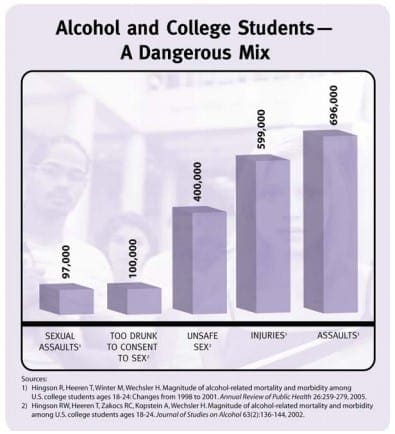Parents – Spring Break Is Another Important Time to Discuss College Drinking
The Effects of Alcohol Are Complex
 Alcohol acts as both a stimulant and a depressant. So, while people who drink may temporarily feel elated and happy, the feeling does not last and alcohol’s depressive effects take over. Discuss the following risks with your college-age sons and daughters:
Alcohol acts as both a stimulant and a depressant. So, while people who drink may temporarily feel elated and happy, the feeling does not last and alcohol’s depressive effects take over. Discuss the following risks with your college-age sons and daughters:
- Their inhibitions and memory soon become affected, so they could say and do things they might regret or might not remember doing at all.
- Their decision-making skills are also affected. They may become restless and aggressive. They may be more inclined to get into fights, trash a house, or make unwise decisions about sex.
- Their physical control is affected as well— they can experience loss of balance, slurred speech, or blurred vision.
It’s important to remember, too, that:
- Critical driving skills and decision-making abilities are diminished long before someone begins to show the obvious physical signs of intoxication. As your college-age son or daughter consumes more alcohol, fine motor skills and reaction time begin to suffer. This compromises driving abilities even further and increases the risk of having an alcohol-related traffic crash.
- Young people are less sensitive than older adults to alcohol’s effects on alertness, so they can drink longer before feeling drowsy. But that is exactly when many serious problems occur. Under the influence of alcohol, even normal activities such as swimming, running, or just crossing a busy street can become truly dangerous—and potentially life threatening.
- Eventually, everyone who drinks to excess—including young adults—will get sleepy and pass out. They could then vomit and choke to death or simply stop breathing because reflexes like gagging and breathing can become suppressed.
Talk with Your College-Age Sons and Daughters
Research shows that parents do make a difference. Talking with your college-age sons and daughters about alcohol now could prevent serious problems later.
Drinking too much can mean trips to the emergency room, arrests, sexual assaults, and putting themselves and their friends in real danger. Ask them to consider—is that any way to celebrate?
Read MoreParents – Spring Break Is Another Important Time to Discuss College Drinking
The Effects of Alcohol Are Complex
 Alcohol acts as both a stimulant and a depressant. So, while people who drink may temporarily feel elated and happy, the feeling does not last and alcohol’s depressive effects take over. Discuss the following risks with your college-age sons and daughters:
Alcohol acts as both a stimulant and a depressant. So, while people who drink may temporarily feel elated and happy, the feeling does not last and alcohol’s depressive effects take over. Discuss the following risks with your college-age sons and daughters:
- Their inhibitions and memory soon become affected, so they could say and do things they might regret or might not remember doing at all.
- Their decision-making skills are also affected. They may become restless and aggressive. They may be more inclined to get into fights, trash a house, or make unwise decisions about sex.
- Their physical control is affected as well— they can experience loss of balance, slurred speech, or blurred vision.
It’s important to remember, too, that:
- Critical driving skills and decision-making abilities are diminished long before someone begins to show the obvious physical signs of intoxication. As your college-age son or daughter consumes more alcohol, fine motor skills and reaction time begin to suffer. This compromises driving abilities even further and increases the risk of having an alcohol-related traffic crash.
- Young people are less sensitive than older adults to alcohol’s effects on alertness, so they can drink longer before feeling drowsy. But that is exactly when many serious problems occur. Under the influence of alcohol, even normal activities such as swimming, running, or just crossing a busy street can become truly dangerous—and potentially life threatening.
- Eventually, everyone who drinks to excess—including young adults—will get sleepy and pass out. They could then vomit and choke to death or simply stop breathing because reflexes like gagging and breathing can become suppressed.
Talk with Your College-Age Sons and Daughters
Research shows that parents do make a difference. Talking with your college-age sons and daughters about alcohol now could prevent serious problems later.
Drinking too much can mean trips to the emergency room, arrests, sexual assaults, and putting themselves and their friends in real danger. Ask them to consider—is that any way to celebrate?
Read More